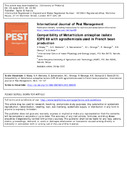Compatibility of Metarhizium anisopliae isolate ICIPE 69 with agrochemicals used in French bean production
Date
2012-04Author
Niassy, S.
Maniania, N.K
Subramanian, S.
Gitonga, L.M.
Maranga, R.
Obonyo, A.B.
Ekesi, S.
Metadata
Show full item recordAbstract
The compatibility of the Metarhizium anisopliae (Metschnikoff) Sorokin isolate ICIPE 69, which is being developed as a biopesticide for the control of Frankliniella occidentalis Pergande, was assessed under laboratory conditions with 12 agrochemicals including 5 insecticides (thiamethoxam, L-cyhalothrin, imidacloprid, chlorpyrifos, diazinon), 1 botanical insecticide (azadirachtin), 2 acaricides (abamectin, spiromesifen), and 3 fungicides (carbendazim, copper hydroxide, probineb) used in French bean production. The insecticides abamectin and imidacloprid were highly compatible with M. anisopliae; thiamethoxam was compatible, whereas azadirachtin and L-cyahalothrin were toxic to the fungus, adversely affecting vegetative growth and sporulation. The acaricide spiromesifen was moderately toxic, while the fungicides carbendazim, probineb, and copper-hydroxide were very toxic to the fungus. The combination of the M. anisopliae
isolate ICIPE 69 with imidacloprid or thiamethoxam did not result in any synergistic or antagonistic effects to larvae of F. occidentalis. However, the combination of lower concentrations of the fungus with thiamethoxam resulted in a shorter lethal time (LT50) compared with individual treatments. Our results suggest that application of the fungus with agrochemicals has to be assessed carefully prior to any field intervention.
